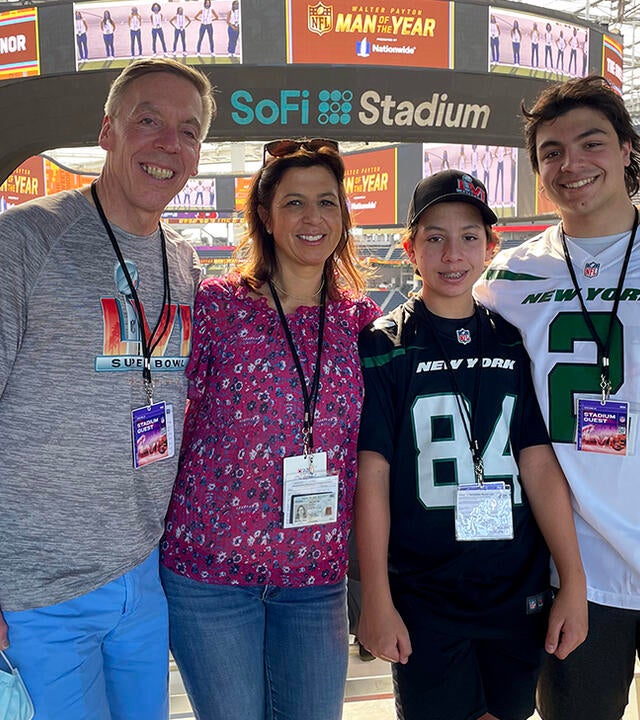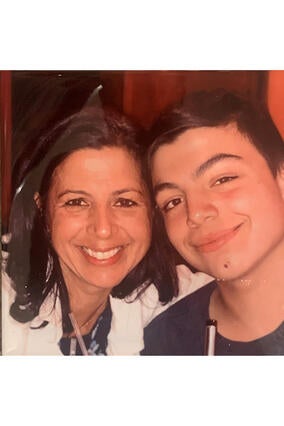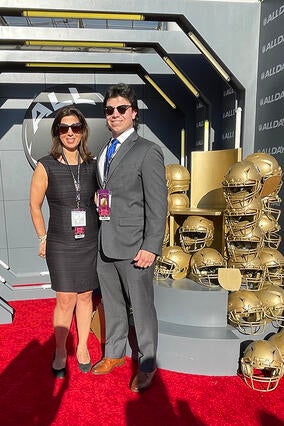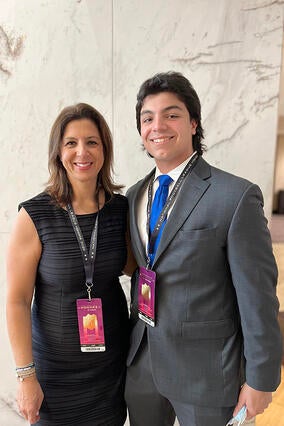
How a Wish Brought Us Hope and Community
By Shanthy Hughes, Wish Mom and Women's Council Member
There was a definitive moment, when I went from being the mother of a happy, outgoing, athletic 14-year-old boy to being the mother of a very sick child. In early June of 2018, my son David was diagnosed with Systemic Lupus Erythematosus. It wasn’t an easy diagnosis — to get to the bottom of, or to process emotionally.
In fact, it took two trips to the ER and admission to the hospital before a growing team of specialists were able to piece together the clues that finally led us to some answers. David had been running a temperature and was sick for weeks with what we assumed was a GI-related virus he just couldn’t shake. We didn’t know it at the time, but because of the Lupus, he had inflammation throughout his body, all his organs were enlarged, his kidneys weren’t functioning properly, and his blood pressure was extremely high.

From the time his symptoms started on May 22, 2018 to the day he was finally discharged from the hospital 21 days later, he had lost 20 pounds. He’d done little more than sleep, eat (when he felt up to it), and submit to one test, exam, poke or prod after another. His team of specialists included an infectious disease doctor and an oncologist - there were so many people responsible for his care that they couldn’t even fit inside his hospital room at the same time. They had to deliver the news of his diagnosis in the hallway.
The thing I keep coming back to is that yes, this happened to my family, to us… but it could happen to anyone. Life can come at you from left field. It’s important for others to understand that, because adjacent to that understanding is compassion and empathy, a connection point that makes it clear why organizations like Make-A-Wish are so important.
When David was diagnosed, he was a naive freshman in high school. Processing and accepting the fact that he now had a lifelong illness that required constant monitoring, medication, and lifestyle changes was not something he knew how to do. His medical team told him that by the time school started again in September, he’d feel a lot better — and it really did take that long for him to turn a corner.
But David also had this unique way of just being in the moment. Because it was so difficult for him to think in terms of “the rest of my life,” he would focus on that particular day and how to get through it. Who was coming to visit? What was for lunch? Who called or texted? It wasn’t like that for me.
I couldn’t let go of the big picture. I tried to set small, short-term goals for myself: “Today I will not cry in front of David.” “Today I will let my friends organize a meal-train for us.” It was overwhelming.
David’s diagnosis came less than three months after my husband, Rob, had been diagnosed with bladder cancer, so our family was already reeling. Our youngest son, Carson, was only 10 at the time. He was scared, and kept asking what disease he would get. All of these things took a toll.

The seed for our Make-A-Wish experience was first planted by David’s nephrologist. She mentioned he was eligible for a wish at one of our first appointments, and my initial reaction was – I don’t want him to be eligible, because accepting that meant I had to accept that he was very, very sick. We were so committed at the time just getting him well, the idea of Make-A-Wish felt bittersweet. It was sobering to know that he qualified. But at the same time, it was amazing to think about this incredible way that perfect strangers can come together — under the idea of a shared humanity and purpose — and do everything within their power to make your sick child happy.
It’s a misconception to think of Make-A-Wish as a child’s last wish. It may sometimes be that, but it’s so much more than that and for many people like us. It isn’t about just having a terminal illness or a final wish. If I had to sum it up in one word, I’d say it’s about hope.
David was on steroids that first year, along with a lot of other meds. There were three-to-four drugs to regulate his blood pressure, a proton pump inhibitor, vitamins and supplements. He was readmitted to the hospital and diagnosed with Lupus-related anti-phospholipid syndrome, blood clots formed in the superficial veins in his arms. He had to get regular injections of a blood thinner.
So when we first talked about Make-A-Wish, David wasn’t interested. I think there was a part of him that didn’t want to be labeled the sick kid, he didn’t want the attention. He wanted to fit in, to be like other kids his age. But after that first year, I went ahead and filled out the paperwork.
Once he was officially accepted, we talked about it again. David was shocked that he qualified and, admittedly, there was still some resistance on his part, but eventually he came around. I will never forget how it was presented to me by the Make-A-Wish team. They said, “These kids don’t get to choose. They are told when to go to the doctor, when to start treatment, what drugs to take, and they have to make so many sacrifices along the way. School events, family gatherings, vacations, so much is compromised by being sick. But this is something they get to control. They get to choose.” That was just such a beautiful and caring way to put it.

In December 2020, Make-A-Wish came to our home and they told David to “dream big.” It was an amazing thing to consider. His first choice was a hockey championship (David played from the time he was 10, but had to give up contact sports during his initial treatment period.) But then Covid hit, and Europe suddenly wasn’t an option. So he asked for Super Bowl 2021, but in those devastating months before vaccines, that wasn’t an option either, and he was given the opportunity to choose something else. He decided to wait it out and attend Super Bowl 2022. None of us take it lightly that this was an option for him, the fact that his disease is stable now, that he’s healthy, that is a luxury so many do not get.
The impact of Make-A-Wish on our lives — on David’s life — is not something that is easy to put into words. The entire experience was flawless; thoughtfully and compassionately executed. There were no missteps. We were treated like royalty, and it felt like they honestly could not do enough for us. We were supported in such a kind and generous way. It was an unparalleled experience.
For David, I think being at the game itself was a highlight, but then to also attend the NFL Honors pushed it over the top. If was amazing to experience everything that was packed into just five days. After the second night, we looked at each other and said, “Can you believe we get three more days of this?!” When we were with the Make-A-Wish staff, we felt as if we were embraced by friends in the most caring and generous way.

There were 15 families on our trip and the sense of community and camaraderie was strong. I connected with another mom who lives on the West Coast and we have texted each other every day since. We have this incredible shared experience of a lifetime, plus the deeper understanding of what it means to parent a child who is dealing with an illness — those two things alone create a very strong bond.
I personally wanted to find ways to give back, to support the foundation and do my part to help give others the same opportunity that was given to us. I joined the Metro New York Women’s Council and continue to fundraise and donate through the Long Beach Polar Bear Splash and Lupus Walk. I remember the first time we did the Splash, I turned to my husband and said, “We’ll be doing this for the rest of our lives.”
I think it’s very important as parents to invest in self-care. That is my advice. If you are in a position where you feel like you are treading water, know that anything can pull you under. You have to do better than tread water. So, take the help - wherever it comes from. Meals, support, anything and everything. As a social worker I knew this, but I was accustomed to giving help, not receiving it. That all had to change to stay strong for myself and for my family.
And for all the Make-A-Wish families, this wish is absolutely about hope. It’s about kids in treatment being motivated to keep going because they are waiting for their wish. It’s about parents wanting to embrace that one thing that will put a smile on their sick child’s face.
I don’t think I fully understood the importance and the beauty and the generosity of all this until it was given to us. And now I will do whatever I can to continue paying it forward. To me, that’s what community is all about.